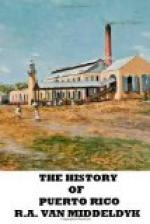A law passed, it appears, at the petition of a single individual, in 1542, increased the confusion and discord still more. This law made the pastures of the island, as well as the woods and waters, public property. The woods and waters had been considered such from the beginning, but the pastures, included in the concessions of lands made at different times by the crown, were private property. The result of this law was aggression on the part of the landless and resistance on the part of the proprietors, with the consequent scenes of violence and civil strife.
Representations against the law were made by the ecclesiastical chapter, by the city attorney, and by the three crown officers in February, 1542; but the regidores, on the other hand, insisted on the compliance with the royal mandate, and reported that when the law was promulgated, all the possessors of cattle-ranges opposed it, and four of their body who voted for compliance with the law were threatened to be stoned to death and have their eyes pulled out. “We asked to have the circumstance testified to by a notary, and it was refused. We wanted to write to your Majesty, and to prevent any one conveying our letters, they bought the whole cargo of the only ship in port, and did the same with another ship that came in afterward....”
On the 2d of June following they wrote again: " ... An alcalde, two aldermen, and ten or twelve wealthy cattle-owners wanted to kill us. We had to lock ourselves up in our houses.... The people here are so insubordinate that if your Majesty does not send some one to chastise them and protect his servants, there will soon be no island of San Juan.”
The system of electing annual governors among the residents was abolished in 1544, and the crown resumed its prerogative with the appointment of Geronimo Lebron, of la Espanola, as governor for one year. He died fifteen days after his arrival, and the Audiencia named licentiate Cervantes de Loayza in his place, who was compelled to imprison some of the ringleaders in the party of opposition against the pasture laws. This governor wrote to the emperor in July, 1545: " ... I came to this island with my wife and children to serve your Majesty, but I found it a prey to incredible violences....”
Cervantes was well received at first, and the city officials asked the emperor to prorogue his term of office, but as Bishop Bastidas said of the islanders, it was not in their nature to be long satisfied with any governor, and the next year they clamored for his “residencia.” He rendered his accounts and came out without blame or censure.




